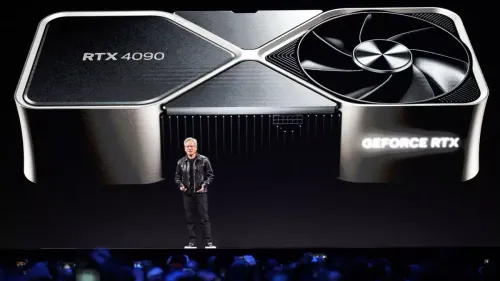Nvidia Unveils New Products at CES 2025 to Transform AI, Gaming, and Robotics
newsWednesday, 08 January 2025 at 04:25

Nvidia introduced several new products at CES 2025 in Las Vegas on Monday. These include advanced AI tools for robots and cars, powerful gaming chips, and the company’s first desktop computer. CEO Jensen Huang explained how Nvidia plans to expand its business into new areas beyond data centers.
AI Tools for Robots and Self-Driving Cars

Nvidia revealed its new "Cosmos" foundation models. These models can create realistic videos that help train robots and self-driving cars. Using synthetic data, Cosmos can teach machines how to understand the world without expensive real-world testing.
Users can provide a text description, and Cosmos will generate a video that follows the laws of physics. This method is cheaper than traditional data collection, such as driving cars on roads or having people train robots.
Cosmos will be available under an open license, similar to Meta’s Llama 3 language models, which are widely used in the tech industry. Huang hopes Cosmos will have the same impact on robotics as Llama 3 has had on enterprise AI.
Challenges Ahead
Despite the potential, some analysts are cautious. Bank of America analyst Vivek Arya noted that for Nvidia’s robotics push to succeed, the products must be affordable and reliable. He compared robotics to other niche markets like the metaverse and self-driving cars, which have yet to become mainstream.
New Gaming Chips for Better Graphics

Nvidia also introduced its RTX 50 series gaming chips. These chips use the company’s latest AI technology, called 'Blackwell.' They promise to make video game graphics more lifelike, particularly in rendering objects with fine details like imperfections and smudges.
The RTX 50 series can also create more realistic human faces in games, a critical improvement where players often notice flaws. The chips will range in price from $549 to $1,999. High-end models will be available on January 30, with more affordable options arriving in February.
Nvidia’s First Desktop Computer

Nvidia took another big step by unveiling its first desktop computer, Project DIGITS. This computer is designed for software developers, not regular consumers. It costs $3,000 and runs on a Linux-based Nvidia operating system.
Project DIGITS uses a powerful chip from Nvidia’s data center line, developed with MediaTek. It provides a compact tool for developers to test their AI systems quickly. The desktop will be available in March.
Automotive Expansion with Toyota
Nvidia also announced a partnership with Toyota. The automaker will use Nvidia’s Orin chips and software for advanced driver assistance in some of its vehicles. Details on specific models were not shared. Nvidia expects automotive revenue to reach $5 billion by 2026, up from $4 billion this year.
Conclusion
So, Nvidia’s announcements at CES 2025 show the company’s ambition to grow beyond its traditional markets. By introducing new AI tools, gaming chips, and desktop computers, Nvidia is positioning itself as a leader in multiple tech fields. The company's stock hit a record high of $149.43, boosting its valuation to $3.66 trillion. Nvidia remains the world’s second-most valuable company, right behind Apple.
Popular News
Latest News
Loading


